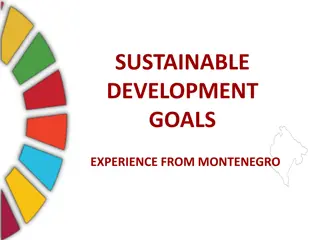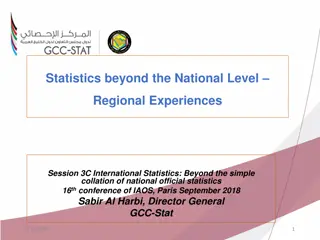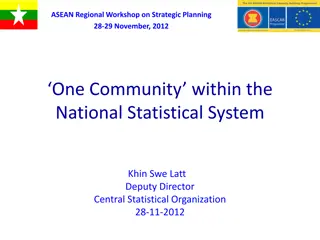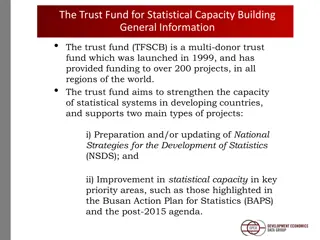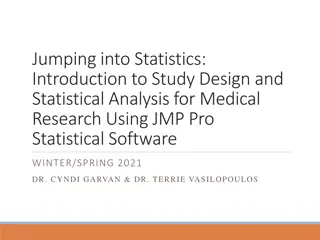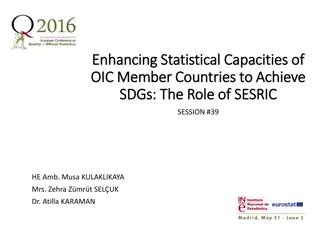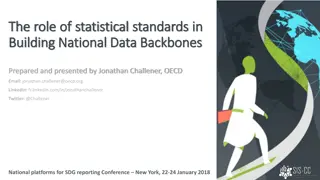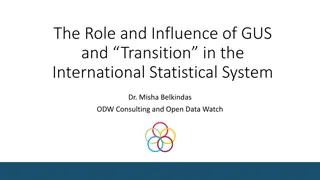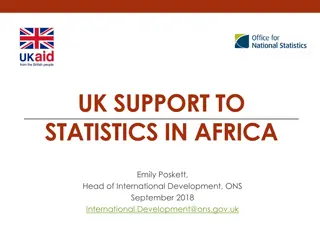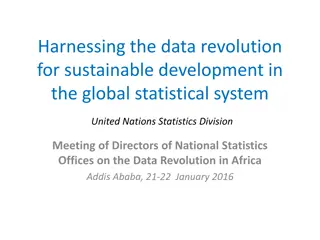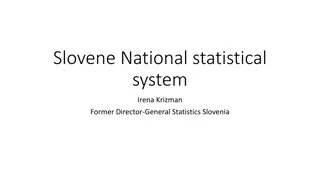Enhancing Global Statistical Systems for Sustainable Development
The post-2015 development agenda emphasizes the need for a comprehensive global policy agenda, impacting statistical systems worldwide. This agenda seeks to improve data collection, coordinate international statistical efforts, and enhance national statistical systems by 2020 to support the Sustainable Development Goals (SDGs). Failure to address these challenges may lead to unsustainable conditions for the global statistical system.
Download Presentation

Please find below an Image/Link to download the presentation.
The content on the website is provided AS IS for your information and personal use only. It may not be sold, licensed, or shared on other websites without obtaining consent from the author.If you encounter any issues during the download, it is possible that the publisher has removed the file from their server.
You are allowed to download the files provided on this website for personal or commercial use, subject to the condition that they are used lawfully. All files are the property of their respective owners.
The content on the website is provided AS IS for your information and personal use only. It may not be sold, licensed, or shared on other websites without obtaining consent from the author.
E N D
Presentation Transcript
Towards a comprehensive global policy agenda: what does it mean for statistics? Enrico Giovannini University of Rome Tor Vergata (enrico.giovannini@uniroma2.it) Global Conference on a Transformative Agenda for Official Statistics New York 15-16 January 2015
The Post-2015 Development Agenda In September 2015 the UN Member States should agree, for the first time ever, on a comprehensive and long-term policy agenda for all countries of the world. Given the wide range of topics covered by SDGs, it is not yet clear how the new agenda will encompass sectoral agendas developed over the years by the UN and other international, supranational organisation. regional and
The Post-2015 Development Agenda As Development Goals (MDGs), the adoption of SDGs should also stimulate a massive investment to improve the availability and the quality of statistical indicators. already happened with the Millennium The demand for SDGs indicators should absorb existing sectoral programs. If it does not happen the global statistical system could face an unsustainable situation, given the limited resources available.
The Post-2015 Development Agenda The report A World that Counts published by IEAG calls for a better coordination programmes developed organisations. of international statistical by Notwithstanding the improvements made over the last few years, such unsatisfactory, especially in terms of data collection and the development of common infrastructures. a coordination is still
The Post-2015 Development Agenda The paper provides some ideas on how to improve the situation: preliminary taxonomy of global initiatives and links to SDGs; a method for building a comprehensive global statistical programme; ideas on how to improve the coordination of statistical activities carried out by international, regional and supranational organisations; recommendations on how the functioning of national statistical systems could be improved. The paper has been prepared to stimulate a process that could significantly improve, by 2020, the current condition of the international statistical system.
The MDGs reporting system: a big challenge for developing countries
Preliminary assessment of the data availability for SDGs A lot of data do not exist or are produced too late Big differences between developed and developing countries None looks able to produce all data with the necessary timeliness
Proposals to better structure the UNSC work Although the list of indicators needed to monitor progress towards SDGs will not be agreed before the beginning of 2016, the following actions could be undertaken in 2015: The tentative list of SDGs indicators should be mapped with the activities carried out by the UNSC, to check whether the current domains used to frame the work of the UNSC should be adjusted to better incorporate the subject matters included in the SDGs list or whether new domains of statistical activities should be included. A very first attempt to do that is contained in the paper. A detailed analysis has to be carried out to develop, by the end of 2015, a comprehensive proposal to be presented for decisions at the 2016 meeting of the UNSC.
Towards global statistical infrastructures for SDGs Develop a coordinated global statistical programme Strengthen the role of CCSA Implement the recent MoU signed by UN, WB, regional development banks and IMF Establish new rules to engage key non-governmental data providers in the international statistical system Develop a global data and metadata collection portal Establish aglobal statistical cloud Speed up the development and the adoption of standards for data and metadata exchange
Towards global statistical infrastructures for SDGs Quickly identify a research agenda to fill the existing gaps in statistical standards Develop a proposal to speed up the process of standard setting at global level and to fully benefit from the work done outside the UNSC mandate Foster the linkage between statistical and geospatial information and standards Establish a global data users network
Challenges and opportunities for national statistical systems Priority setting SDGs and other internationally agreed policy goals are not necessarily fully aligned with national priorities; One of the main challenges for national statistical systems is represented by the development of multi- purpose statistical tools and approaches. The design of a multi-year statistical program through a strong engagement of all stakeholders is vital also at national level.
Challenges and opportunities for national statistical systems Priority setting National strategies for the development of statistics (NSDS) have to be updated; PARIS21 should review the NSDS framework by the end of 2015, to allow interested countries to use it in 2016 to launch national negotiations aimed at developing SDGs indicators.
Challenges and opportunities for national statistical systems Institutional setting The data revolution and the SDGs may be a great opportunity to strengthen the institutional setting of national statistical offices and systems. Statistical authorities will be more oriented to re-use data collected by other organisations. Therefore, administrative data and other Big Data must be fully accessible to national statistical offices, who will also be mandated, much more than in the past, to check the quality of data produced by others.
Challenges and opportunities for national statistical systems Institutional setting Appropriate revisions of legal and institutional settings under which statistical agencies operate supported by: the adoption of global principles on legal and technical issues; the update the recommendations issued by international organisations on how to organise statistical systems; the review of principles for confidentiality protection, while allowing the maximum circulation of properly anonymised data for research and business purposes.
Challenges and opportunities for national statistical systems Institutional setting A higher responsibility of NSOs needs to be accompanied by a stronger national and international system for verification and monitoring of possible misbehaves. Therefore: proposals to strengthen the architecture of the international statistical system have to be developed, including the establishment of an independent body such as Worldstat , who would have a watchdog function vis- -vis national and international bodies active in statistics (like it already happens in Europe).
Challenges and opportunities for national statistical systems Experiment new approaches The very high pace of technological and methodological developments, as well as the availability of new sources, require a growing capacity by NSOs to benefit from them. Given the limited resources available, it is vital to join forces to experiment new approaches and exploit economies of scale. For example: the use of satellite images by a properly resourced central unit; the development of experimental statistics and indicators on some new SDGs domains, or of early estimates could be carried out at global or regional levels.
Challenges and opportunities for national statistical systems Experiment new approaches It is vital that statistical offices and national statistical systems invest in continuous innovation to minimise costs and improve efficiency and the quality of services provided to users. Modernization of national statistical systems should be broadly formulated in terms of mainstreaming principles and standards, strengthening institutional arrangements (including access and use of public and privately generated administrative data sources) and harmonizing and centralizing statistical production processes using a standard- based architecture (see other papers).
Challenges and opportunities for national statistical systems Experiment new approaches This approach would have important organisational and human resources implications: Statistical divisions of international and regional organisation are not used to directly treat microdata to compile aggregate statistical figures; At national level it is not so easy to have technological and human resources able to deal with new data sources or to compile nowcasts . The IEAG Report recommended the establishment of a SDGs lab to carry out this kind of activities and exploit global data sources.
Challenges and opportunities for national statistical systems New opportunities for capacity building It is quite clear that developing countries will continue to face huge challenges to meet the global statistical agenda. Without additional resources, most of them will not be able to produce the SDGs indicators with the desired timeliness. Therefore, the key question is how to build an institutional and financial framework to allow developing countries to make a leapfrog.
Challenges and opportunities for national statistical systems New opportunities for capacity building The recent Synthesis Report published by the UN Secretary General has picked up the IEAG recommendation of considering the statistical capacity building dimension as an important part of the new investments for development. Moreover: all countries are encouraged to adopt their own national sustainable development financing strategies . - The July 2015 conference on financing for development will be crucial.
Challenges and opportunities for national statistical systems New opportunities for capacity building The development of a SDGs data compact associated to NSDS could help developing countries and the international community of donors to identify priorities, actions and expected outputs, increasing the accountability of public policies in this field. However, it would be important to go, where necessary, beyond the national dimension to fully exploit opportunities coming from Big Data and from the data revolution and to orient new investments towards the adoption of the most innovative solutions, and not a copy of approaches already used in developed countries.
Conclusions A very challenging process, full of opportunities and risks Business as usual is not an option Next 12-18 months will be crucial NSOs and international organisations have to speed up the change: Innovation will be crucial Organisation will be crucial Funding will be crucial
UN SGs Synthesis Report Today s world is a troubled world; one in turmoil and turbulence, with no shortage of painful political upheavals. Societies are under serious strain, stemming from the erosion of our common values, climate change and growing inequalities, to migration pressures and borderless pandemics. It is also a time in which the strength of national and international institutions is being seriously tested. The nature and scope of this daunting array of enormous challenges necessitate that both inaction and business-as-usual must be dismissed as options. If the global community does not exercise national and international leadership in the service of our peoples, we risk further fragmentation, impunity and strife, endangering both the planet itself as well as a future of peace, sustainable development and respect of human rights. Simply put, this generation is charged with a duty to transform our societies.







